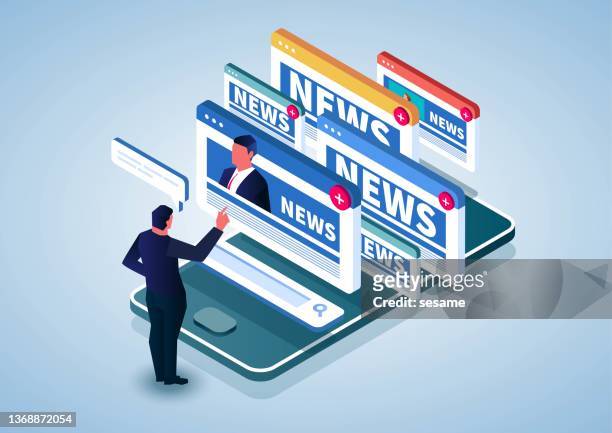The Significance of Fact-Checking on the planet of News Online
The frequency of false information in today's online news landscape has actually gotten to worrying degrees. Fact-checking companies play an essential function in counteracting this trend. They verify cases and improve the integrity of journalism. However, the efficiency of these organizations often hinges on their methodologies and public perception. As target markets navigate this complex setting, the effects of their findings may shape the future of news consumption and trust. What does this mean for the integrity of information moving on?

The Increase of Misinformation in the Digital Age
Just how has the arrival of digital technology added to the spread of misinformation? The fast development of the web and social networks platforms has helped with the circulation of info at an unmatched speed. Individuals can share posts, video clips, and viewpoints with a mere click, frequently without verifying the web content's accuracy. Formulas prioritize sensational or psychologically billed product, leading to an expansion of deceptive narratives that record attention.
In addition, the anonymity afforded by electronic systems permits people to spread out incorrect details without liability (stnews.live). Misinformation prospers in resemble chambers, where users are subjected largely to point of views that reinforce their beliefs, further entrenching frauds. The saturation of information can bewilder customers, making it challenging to recognize legitimate sources from undependable ones. Subsequently, false information has actually become a pervasive problem in the digital landscape, influencing public point of view and count on legit news resources
The Role of Fact-Checking Organizations
Fact-checking companies play a necessary duty in boosting the reliability of journalism by validating claims made in news reports. Their efforts are vital in combating misinformation, guaranteeing that precise info prevails in the electronic landscape. By holding media outlets liable, these organizations add considerably to informed public discussion.
Enhancing Credibility in Journalism
While false information proliferates in the digital age, fact-checking companies play a necessary role in enhancing the reputation of journalism. These companies diligently validate insurance claims made in newspaper article, public declarations, and social media sites blog posts, ensuring that information shared to the public is accurate and reliable. By supplying independent assessments, they serve as an essential resource for reporters, helping them keep high standards of stability. Additionally, their initiatives promote transparency in media, promoting public trust. As audiences come to be increasingly critical, the presence of trusted fact-checking entities can differentiate reliable news resources from those that may spread falsehoods. Inevitably, the commitment of fact-checking organizations to maintain reliability is vital for the health and wellness of democratic discussion.
Combating Misinformation Successfully
As misinformation proceeds to spread quickly throughout digital systems, the function of fact-checking companies comes to be progressively vital in the fight for precise information. These companies serve as watchdogs, scrutinizing insurance claims made by somebodies and media electrical outlets to ensure liability. By utilizing rigorous research study methods and expert evaluation, they verify realities and clarify deceptive narratives. Their searchings for are distributed with various networks, enlightening the general public and promoting essential reasoning. Additionally, collaborations with social media platforms enhance their reach, enabling punctual flagging of incorrect information. As digital literacy expands, the impact of fact-checking organizations is essential in equipping audiences to determine fact from fraud, inevitably adding to an extra informed society.
Exactly How Misinformation Affects Public Understanding
False information significantly undermines count on media, leading audiences to question the reputation of news sources. As an outcome, people usually gravitate in the direction of electrical outlets that enhance their current ideas, adding to the polarization of viewpoints. This dynamic creates a fragmented information landscape, where shared recognizing comes to be increasingly difficult to achieve.
Rely on Media

Rely on media has actually ended up being significantly fragile in the digital age, where the fast spread of incorrect info can alter public perception. As misinformation multiplies throughout social media sites and online platforms, audiences typically find it testing to determine reputable sources from unstable ones. This unpredictability fosters suspicion, leading lots of individuals to question the objectives behind news reporting. Count on in established media electrical outlets has actually reduced, as consumers progressively turn to different sources that might do not have strenuous content standards. This erosion of depend on not just impacts individual ideas yet additionally weakens the cumulative ability to involve in informed discussions. Ultimately, the integrity of journalism goes to risk, highlighting the essential demand for reliable fact-checking to bring back confidence in the media landscape.

Polarization of Viewpoints
The increasing skepticism toward traditional media has contributed to a growing special info polarization of point of views among the public. False information, usually shared through social media sites and on-line platforms, plays a considerable function in forming distinctive ideological separates. People regularly look for out details that aligns with their pre-existing ideas, enhancing their point of views while disregarding opposing viewpoints. This echo chamber effect increases divisions, resulting in a fragmented public discourse where consensus becomes significantly elusive. Additionally, sensationalized stories prosper in this atmosphere, better skewing public assumption and promoting distrust in qualified sources. As polarization escalates, the necessity for reliable fact-checking comes to be critical to bridge voids and advertise educated discussions, inevitably making sure a much more natural culture with the ability of steering complex concerns.
Strategies for Efficient Fact-Checking
Reliable fact-checking relies upon a methodical approach that consists of detailed study, confirmation of sources, and critical evaluation of claims. A fundamental method is cross-referencing details from several qualified resources to validate its precision. Fact-checkers often make use of specialized data sources and archives to map the beginning of certain statements, guaranteeing that the reported information lines up with documented proof.
Another necessary technique includes looking at the context in which cases exist. Misleading info can arise from out-of-context quotations or selective information usage. By checking out the more comprehensive narrative, fact-checkers can determine potential predispositions or misinterpretations.
In addition, engaging with experts in appropriate fields can give quality and insight that boosts the fact-checking procedure. This collaboration can uncover subtleties that laypeople might overlook - stnews.live. Eventually, a regimented strategy combining these techniques fosters a much more enlightened public, enhancing the integrity of information disseminated in the digital age
The Impact of Social Media on News Intake
Exactly how has social media sites transformed the way individuals take in news? The emergence of systems like Facebook, Twitter, and Instagram has especially transformed news usage patterns. News is now distributed rapidly, permitting view publisher site customers to accessibility real-time updates and engage with material via likes, shares, and remarks. This immediacy has cultivated a preference for bite-sized info, frequently at the expense of extensive analysis.
Social media makes it possible for individualized news feeds, where algorithms curate content based on user preferences, creating echo chambers that might restrict direct exposure to diverse perspectives. The duty of standard news electrical outlets has reduced as individuals progressively rely upon peer suggestions and trending topics. Subsequently, the reputation of details is frequently compromised, as sensationalism can overshadow factual coverage. Generally, social media has improved news consumption, stressing speed and customization while challenging the standards of journalistic stability.
Empowering Audiences to Determine Trusted Sources

Furthermore, analyzing the authorship and business background of news write-ups can expose potential predispositions. Cross-referencing details across numerous credible outlets better enhances the confirmation process. Making use of electronic devices, such as web browser expansions that rank the trustworthiness of websites, can also aid in identifying trustworthy information. By actively engaging with these resources and cultivating a crucial frame of mind, audiences can better equip themselves to discern dependable news sources, inevitably cultivating an extra enlightened society in the middle of the intricacies of today's media environment.
The Future of Journalism and Fact-Checking
As the media landscape evolves, the future of journalism and fact-checking encounters both challenges and possibilities. The rise of electronic systems has equalized details circulation, permitting varied voices to emerge. This has additionally led to the proliferation of false information, necessitating durable fact-checking devices. Journalists will significantly depend on modern technology, including AI tools, to verify facts swiftly and successfully.
Partnership in between news companies and fact-checking entities is prepared for to reinforce reputation and transparency. Audience involvement will certainly play a vital function, as informed visitors end up being considerable partners in determining reliable web content.
The need for liability and precision is likely to grow, pressing journalists to copyright high criteria in their coverage. Eventually, the future of check this journalism might depend upon its ability to adjust to technological improvements while keeping journalistic honesty, making certain that fact-checking remains a cornerstone of qualified news.
Often Asked Concerns
How Can I Report Misinformation I Experience Online?
To report false information run into online, individuals can utilize platform-specific coverage devices, supply clear proof, and share the information with fact-checking organizations. Involving with community conversations can also aid elevate understanding concerning the false information.
What Prevail Signs of Misinformation in News Articles?
Common signs of misinformation in news write-ups consist of thrilling headlines, lack of legitimate sources, emotional language, inconsistent facts, and absence of author credentials. Viewers must critically evaluate content for these indications to discern precision.
How Do Fact-Checkers Validate Sources?
Fact-checkers validate resources by cross-referencing information with reputable data sources, seeking advice from professionals, and examining the initial context of insurance claims. They also evaluate the dependability of the sources, making sure accurate and trustworthy information for public consumption.
What Lawful Actions Can Be Taken Against False information?
Lawsuits against false information might include vilification claims, cease-and-desist orders, and governing charges. Sufferers can prosecute with civil courts, while some jurisdictions enforce fines or permissions on platforms sharing incorrect details.
Exist Apps for Fact-Checking News On-The-Go?
Various apps exist for fact-checking news on-the-go, consisting of Snopes, FactCheck.org, and PolitiFact. These applications aid individuals confirm claims promptly, advertising notified decision-making and promoting a much more critical approach to consuming news in real-time.